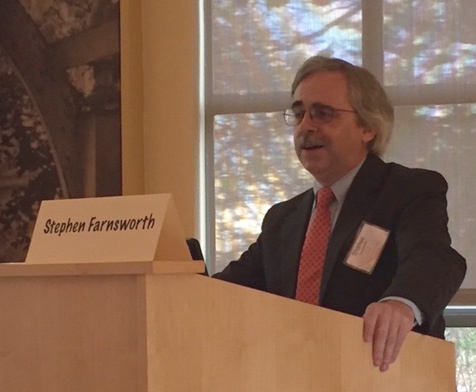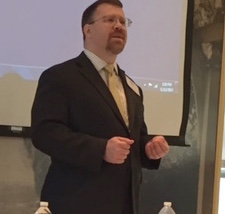|
VCOG on the road
In November, VCOG's Megan Rhyne taught her second 6-hour course on FOIA for the Christopher Wren Association, an adult continuing education organization at William & Mary.
Rhyne will participate in the League of Women Voter's annual legislative preview program Dec. 2.
VCOG notes
VCOG's board of directors will meet Dec. 9 in Glen Allen.
VCOG will soon be announcing the 2015 Chip Woodrum Legislative Intern. Applications for the internship were due before Thanksgiving, and applicants are now being interviewed.
FOIA Council opinions
One of the FOIA Council’s two most recent opinions dealt with closed meetings, while the other addressed access to police body camera footage.
In AO-07-15, a Herndon Town Council member asked about the propriety of being refused access to certain records he needed to prepare for a meeting. The council noted that board members have no more, but also no fewer, rights under FOIA than does an everyday citizen. The council also confirmed that FOIA does not prohibit a council member from speaking out about what took place in a closed session or from distributing a document that was prepared for exclusive use in a closed meeting, though the council also noted that doing so “may lead to political and other problems such as adversely impacting the Town's bargaining position.”
In AO-08-15, the council first pointed out that the footage is a public record and that it must be evaluated under existing FOIA provisions. The council then pointed out that release of the footage would be dependent on whether it was considered a noncriminal record, whether it is a compilation, and whether it is a local law enforcement agency versus the state police or other entity with law enforcement powers. Further complicating the issue is that while some parts of the records would be exempt, others would not contain exempt material; yet the Supreme Court’s recent ruling in Surovell v. DOC throws into doubt the general duty to redact.
FOIA Council's legislative preview
The FOIA Council held its annual legislative preview meeting Nov. 18 and heard about six possible proposals. Three of the proposal were offered by Del. Rick Morris, R-Carrolton, and one of those is a repeat of one he offered during the 2015 session. It would make FOIA violations made “without legal justification” a Class 1 misdemeanor. Another proposal would require government officials to use their government-issued email address when conducting public business. A third would require a member of the press to be present during a closed meeting.
Council Vice Chair Sen. Richard Stuart, R-Montross, and others expressed reservations about the misdemeanor bill, worrying that individuals with political axes to grind could swear out misdemeanor warrants just to cause mischief, while a representative for commonwealth attorneys worried that inexperienced lower level employees could be punished. Morris noted that several other states criminalize open records violations but that he hoped no one would be prosecuted under his bill. Yet, he said, it's something that should be out there because he’s heard from several citizens whose FOIA requests were ignored.
Several people also expressed concern over the third proposal, wondering how it would be decided who a member of the news media was and cautioning against “institutionalizing” the press. A representative for the Virginia Municipal League and the Virginia Association of Counties pointed out that if a reporter is in a closed session, it’s not really a closed session at all.
An attorney for the Virginia Eduction Association said the group would like to see reinforced protections of data on teacher performance. The attorney also said VEA would like to make sure teachers are given notice when anyone requests information from their personnel file. Rob Jones, director of government relations for VEA, said teachers fear unfair criticism if testing data is released. “No teacher should wake up and read in the newspaper that they are the worst teacher in their school,” he told the Daily Press.
Daily Press reporter Dave Ress presented a bullet-point draft of several changes he would like to see adopted by the FOIA study committee — which will produce a legislative proposal for 2017. The items on the list include better privacy protections, multiple exemptions condensed into broad general categories, the release of completed police investigations, and clarifications of custodianship and the public interest being protected by withholding records. The proposal would also beef up closed meeting procedures, enforcement and sanctions.
Maria Montgomery, managing editor of the Winchester Star, also urged the council’s study committee to consider giving the council authority to resolve FOIA disputes, as the Connecticut FOI Commission does.
|
FOIA audit yields mixed results
Thirteen Virginia newspapers worked together to produce an audit of at least 40 localities, including their local governments, school boards and police departments, to request specific, non-exempt records.
The central story that went into all of the participating papers said more than half of the queried police or sheriff’s departments refused to give out criminal incident information on recent felonies despite the fact that such information is public, and a quarter of the local governments and school board offices refused to release salary information on certain high-ranking employees.
Nonetheless, in companion stories prepared by the various papers about results in their area, most characterized overall compliance positively.
The main problems were not with the records but with the procedures: several people were asked who they were and whether they worked for the press, and several were asked to put their requests in writing. Neither is sanctioned by FOIA. As Alan Gernhardt of the FOIA Council told the Northern Virginia Daily, government can ask for a request to be put in writing, it just can’t require it.
Here’s a roundup of the various localized stories:
Richmond Times-Dispatch
Daily Progress
Star-Exponent
Northern Virginia Daily
Daily Press
Winchester Star
News & Advance
Suffolk News-Herald
|
Stay up to date on access
Sign up for VCOG's daily listserv on access and First Amendment news from Virginia and accross the country. It's free! |
|
|
Greetings, Friend of VCOG!
At its annual conference Nov. 12 at the Gari Melchers Home and Studio Pavilion of the University of Mary Washington, VCOG presented panels and speakers on issues as diverse as police body cameras and statewide election trends to databases, public universities and federal open-government initiatives. In the process, we raised over $10,5000, more than we ever have for a single conference, thanks to increased attendance and a record number of individual and corporate sponsors.
Please check out a list of those wonderful sponsors here.
Citizens, reporters, lawyers, advocates, computer coders and government officials attended the panels, starting with the body camera and law enforcement technology one presented by John Jones of the Virginia Sheriff’s Association and Kevin Goldberg of the D.C. Open Government Coalition.
 UMW Professor Stephen Farnsworth (at left) put the recent elections into the context of Virginia’s shifting demographics, then Cori Zarick of the White House Science and Technology Police office went over ways the federal government is engaging with state governments to enage citizens and make data more standardized and accessible. UMW Professor Stephen Farnsworth (at left) put the recent elections into the context of Virginia’s shifting demographics, then Cori Zarick of the White House Science and Technology Police office went over ways the federal government is engaging with state governments to enage citizens and make data more standardized and accessible.
A panel followed on access to databases, which some government entities view differently from access to individual records. The panel was moderated by Jack Kennedy, Wise County/City of Norton Clerk of Court, and included Matt Chittum of The Roanoke Times, Rob Poggenklass of the ACLU of Virginia and Ben Schoenfeld of Code for New River Valley.
Kennedy (at right with tie) and Schoenfeld (far left), along with Dave Ress (with light shirt) of the Daily Press, were recipients of VCOG’s annual open government awards for the work all three have done to try to make data on the state’s court system more accessible. You can read about the work they all did here. (Also pictured on the right: VCOG President Craig Fifer.)
 A third panel focused on the public use of private email accounts and devices, with panelists Alan Gernhardt of the Virginia Freedom of Information Advisory Council (at left), Culpeper Town Council member Jon Russell and Glenn Smith of the Library of Virginia reminding people that just because it’s legal doesn’t mean it’s a good idea. The panel was moderated by King George County Attorney Eric Gregory. A third panel focused on the public use of private email accounts and devices, with panelists Alan Gernhardt of the Virginia Freedom of Information Advisory Council (at left), Culpeper Town Council member Jon Russell and Glenn Smith of the Library of Virginia reminding people that just because it’s legal doesn’t mean it’s a good idea. The panel was moderated by King George County Attorney Eric Gregory.
Finally, Adam Goldstein of the Student Press Law Center, Del. David Ramadan, R-Fairfax, and Washington Post reporter T. Rees Shapiro regaled the audience with stories of how they frequently have to go around official channels to get basic information on university operations. VCOG’s vice president, Dick Hammerstrom, led the panel.
For a write-up of the email panel, click here.
Integrity rankings better, but not good
The good news is that Virginia’s ranking in the Center for Public Integrity’s State Integrity Investigation rose from 47th to 16th in just three years. The bad news is that the state scored just 66 points — a D on the grading scale — and only one state, Alaska, scored better than a C-.
Virginia received its best grades on laws and regulations related to electoral oversight (4th in the country), procurement (2nd) and internal auditing (8th). Its ethics enforcement grade went up, owing to some of the reforms put in place following the indictment of former Gov. Bob McDonnell, while judicial accountability and civil service management also scored within the top 10 in the country.
So what dragged Virginia down? Three areas: lobbying disclosure, political financing and access to public information.
VCOG had been critical of the 2012 study, saying it did not take into account the practical realities of how FOIA is implemented. As a result, the 2015 delved much deeper into the both the practice and the procedures. Still, the state came up lacking under the investigation’s criteria because citizens had no way other than court to appeal decisions to deny access to records. The investigation also faulted the FOIA Council’s lack of binding authority and the lack of a law requiring government to publish data online in an open data format. The investigation also gave low marks to the following statement: “In practice, branches of government, state agencies and government officials do not claim to be exempt from access to information laws.”
VCOG’s director Megan Rhyne and its vice president, Dick Hammerstrom, were interviewed for the investigation, as were Alan Gernhardt of the FOIA Council. The investigation also relied on numerous articles from the media
Virginia’s report card can be found here.
Open government in the news
The advocacy organization Judicial Watch assisted Fairfax parents seeking records related to the school board’s adoption of a policy affecting transgendered students. Though it turned over 3,100 responsive documents, the school board petitioned a court for more time to fill the rest of the request. That would have meant the documents wouldn’t be released until after the election, in which several candidates were vying to unseat those who voted in favor of the policy. . . . A spokesman for Governor Terry McAuliffe announced in November that state agencies should brief the governor’s office before department employees commented publicly about the proposed Mountain Valley and Atlantic Coast pipelines. “Things work better when the left hand is aware of what the right hand is doing, preferably before it winds up in the paper,” said spokesman Brian Coy. . . . The U.S. Supreme Court heard arguments in early November over whether California-based Spokeo, a people-search website that aggregates data from multiple sources, including public records, could be sued by a Virginia man, Thomas Robins, for publishing incorrect contact information about him. Robins said the Spokeo profile hurt his employment prospects because it incorrectly reported he was wealthy, had a graduate degree, was married and had children. Robins seeks to represents a class of plaintiffs who are similarly situated. . . . How much does the City of Richmond want to collect $71 million in outstanding property and real estate taxes? So much that it issued letters to city employees who are on the delinquent list saying, “Employees should also be aware that delinquent personal property tax records are considered public information under the Virginia Freedom of Information Act regulations and must be disclosed if the records are requested.” . . . A Newport News circuit court judge refused the dismiss the lawsuit brought by the Daily Press against the Office of Executive Secretary, the administrative arm of Virginia’s court system. Judge David Pugh noted that once data is public it can’t be made un-public: “You can’t unring the bell. You can’t put data out and say ‘I’ll give it to you individually, but I won’t give it to you in bulk.’” State Solicitor General Stuart Raphael complained that FOIA does not make allowances for “co-custodians” of data, like the court and the clerks of court. Though Pugh dismissed that argument, too, and said that though he doubted that much else could be be presented that would change his ruling, he would allow the case to proceed. . . . A Norfolk circuit court judge ruled the Department of Criminal Justice Services had to give the Virginian-Pilot records related to the training of law enforcement agencies, including the officers’ names, the agencies they’ve worked for and when they started and stopped working for those agencies. Though Judge Joseph Migliozzi agreed that the records were personnel records that could have been withheld, the judge ruled the department should have honored its negotiated settlement with the paper to release the records in the department’s discretion. “[T]he Department clearly failed to timely identify, in writing, an exemption for withholding said records.” The judge also rejected the argument that the department was the custodian of the database of records, not the individual agencies that transferred the data to populate the database. . . . Citing citizens’ desire not to be on television, the Martinsville City Council changed its public comment period to be the last item on the agenda for its public meetings and it will not be televised. The rules allow speakers to remain in their seats while addressing the council. Lengthier presentations will be televised unless the speaker opts out and talks with council members before the meeting’s start. . . . The Virginia Hospital and Healthcare Association launched the Quality and patient Safety Scorecard, an interactive website that includes patient safety records for 80 healthcare facilities. The scorecard gathers data from several sources, including the federal Centers for Medicare & Medicaid Services, Virginia Health Information and the Hospital Consumer Assessment of Healthcare Providers and Systems survey. . . . The City of Hopewell’s new ethics committee is still seeking to strengthen its internal rules designed to “stop some of the bickering that seems to go on in the council chambers.” The committee’s work is unrelated to recent allegations of an inappropriate relationship between the vice mayor and the city’s former sheriff, said two of the committee’s members. . . . The Competitive Enterprise Institute filed a petition in Richmond circuit court that alleges George Mason failed to conduct an adequate search of its records in response to the organization’s FOIA request for any emails that contained terms such as “RICO,” “racketeer,” “Racketeering,” “DOJ,” “prosecute” or “prosecution.” GMU said it had no such records. Christopher Horner, who led the American Tradition Institute in its lawsuit against UVA for access to a climate scientist’s email, is CEI’s founder. . . . Franklin County and the Blue Ridge Environmental Defense League continued to spar over access to records related to the proposed Mountain Valley Pipeline. The parties have at times worked together, but the league and Preserve Franklin, both anti-pipeline groups, said in mid-November that the county was “dragging its feet” when it asked for an extension of time to fill the request for all records between county officials and a pipeline interests dating back to June 14. . . . The Department of Motor Vehicles launched an interactive online map that lets citizens see what roads in the Commonwealth have the highest concentration of car accidents. The site is http://dmvnow.com/safety. . . . The judge hearing the case against the Fairfax police officer accused of shooting John Geer split the difference between media interests who wanted to have video cameras in the courtroom and the desire of both the prosecution and the defense to keep all cameras out. Judge Robert J. Smith ruled that still photography will be allowed. The photos will be shot by a pool photographer who will then share photos with various media outlets. Photos of the jurors, police informants, undercover agents, juveniles or any trial exhibits are prohibited. |
|